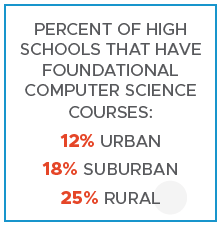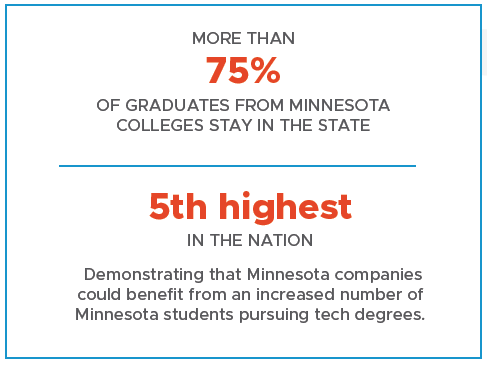By: Katie McClelland, Director, Public Policy & Research
The Minnesota Technology Association (MnTech) has long heard about challenges in finding tech talent, and in order to understand the true magnitude of this challenge has released the first annual Minnesota: State of Tech Talent report, detailing the current tech talent landscape. This report details how the tech sector continues to contribute to the strong Minnesota economy, with the average annual median tech wage at $94,715, 106% higher than the median state wage, an unemployment rate at only 1.1% in the sector, and 1 person hired for every 4 tech positions posted.
 However, much of the good news about tech talent and opportunity ends there. We are 46th in the nation when looking at job growth in large part due to the lack of talent to fill open roles.
However, much of the good news about tech talent and opportunity ends there. We are 46th in the nation when looking at job growth in large part due to the lack of talent to fill open roles.

Minnesota is in the bottom half of the country for representative diversity in tech, with women, Black or African American, Hispanic/Latino, and Native American/Indigenous (BIPOC) populations all underrepresented as compared to their respective representation in the labor force.
In Minnesota, 89% of all tech job postings require a four-year degree, yet less than 22% of BIPOC talent in the Minneapolis/St. Paul metro area hold a bachelor’s degree. By most measures, Minnesota is falling behind when it comes to tech talent development. We are last in the nation, ranked 50th out of 50 states for high schools offering foundational computer science courses.
Only 12% of urban schools, 18% of suburban, and 25% of rural high schools offer foundational computer science courses, and women, Black or African American, Hispanic/Latino, and Native American/Alaskan students are taking advanced placement (AP) exams at rates less than half of their respective overall student populations.
 Minnesota colleges are not producing enough degree holders to meet demand either, as they are annually producing approximately 600 fewer software developers than for which there is demand. However, over the last decade, Minnesota has more than doubled the number of computer science graduates, showing there is opportunity for increases in the years to come. Given that 72% of graduates from Minnesota colleges stay in the state, the 5th highest in the nation, investing in our college’s computer science programs will help solve our talent challenges today and into the future.
Minnesota colleges are not producing enough degree holders to meet demand either, as they are annually producing approximately 600 fewer software developers than for which there is demand. However, over the last decade, Minnesota has more than doubled the number of computer science graduates, showing there is opportunity for increases in the years to come. Given that 72% of graduates from Minnesota colleges stay in the state, the 5th highest in the nation, investing in our college’s computer science programs will help solve our talent challenges today and into the future.
With the breadth of opportunity for improvement in tech pathways in the state, MnTech will will be pushing for more investments in tech talent pipelines, including in computer science education and the SciTech internship program this coming legislative session. We gladly welcome the opportunity to partner with any individuals or organizations interested in engaging in talent development and advocacy as we work to build more inclusive tech talent pipelines.

















